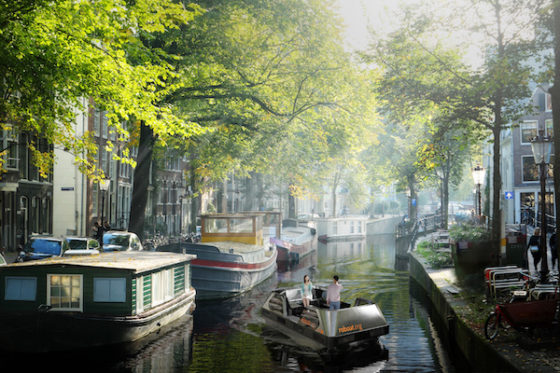Shipshape? Self-driving boat aims to solve Amsterdam’s litter and traffic problems


Amsterdam researchers have launched the first full-sized pilot version of a self-driving boat that they hope will solve the city’s transport gridlock and rubbish problems at a stroke.
The Roboat, a five-year research project by Amsterdam Institute for Advanced Metropolitan Solutions and Massachusetts Institute of Technology, aims to use autonomous floating vessels that can dock and lock together as a way to make better use of Amsterdam’s canals.
Ynse Hendrik Deinema, project co-ordinator, told DutchNews.nl that thanks to the launch of the first full-sized 2 metre by 4 metre model, the Roboat’s people transport capacities will be tested this year, while a version that could act as a floating refuse container will be trialled in 2021.
‘Some would consider Roboat a regular vessel but it’s better to look at it as a platform: these boats can connect to each other to form platforms, bridges or temporary infrastructure,’ he told DutchNews.nl. ‘We have one universal hull design but you can change the top deck according to what functionality you want. We have a boat that can hold five people but also one that is in the works that is a waste collection boat, for household waste.
Fragile
‘The city of Amsterdam has some major challenges regarding mobility and logistics. We have congestion, emissions but we also have a very nice, historic canal system. The infrastructure is very fragile, though, and a lot of quay walls and bridges are in fairly bad shape. The city no longer wants these heavy trucks riding through the city centre and one of the problems is how you collect household waste.’
Last month, for instance, a 20 metre stretch of canal wall in the centre collapsed into the water, while the city is embarking on a programme of repairs that could cost up to €2bn after an official report in July said many bridges and canal walls are crumbling. Roboat’s team points out that there are meanwhile 165 canals in the Dutch capital, taking up about a quarter of Amsterdam’s service area, which were once put to better use than as a venue for pleasure boats.
Deinema said, for example, that Roboat is working on a skip version that could be docked next to a canal wall so people could throw in their trash, possibly down a slide, into the boat. ‘Then, when the boat is full, it sends a signal so a smart Roboat can latch to this container and transport it to a location in the city where all the trash is collected and transported to the incinerator just outside the city limits,’ he explained.
Sofa
However, he acknowledged, there are challenges. ‘What if someone throws in a sofa and then the system is blocked?’ he mused. ‘We are already considering several solutions to overcome this. It is important, though, to show the world that we are considering this as a sensible use case.’
The first challenge, which researchers will now be testing is getting the boats to navigate and sense their environs accurately thanks to sensor kits, GPS, speed control technology and camera-based object detection – to detect the bicycles, discarded toilets and other surprising objects to be found in Amsterdam’s canals.
‘Imagine the near future where you could order a floating platform on demand to get rid of the construction waste from your kitchen renovation,’ added Deinema.
Rain
If used as a mode of transport, the researchers believe the Roboat could be used for established ferry connections, as an on-demand transport service from point to point, or even as a temporary bridge that could ‘open’ if shipping traffic came by.
‘The core of the Roboat is what you could do with this historic infrastructure in a smart way with no emission, powered by a battery, and fully autonomous with no skipper on board,’ said Deinema.
The current people transport model does not have any protection from the weather, because this was judged too expensive and cumbersome for a pilot model, but rain covers would be an option in future. ‘Of course, you could design a roof but that’s a minor detail,’ he added. ‘When it is raining, we are just not going to test.’
Thank you for donating to DutchNews.nl.
We could not provide the Dutch News service, and keep it free of charge, without the generous support of our readers. Your donations allow us to report on issues you tell us matter, and provide you with a summary of the most important Dutch news each day.
Make a donation